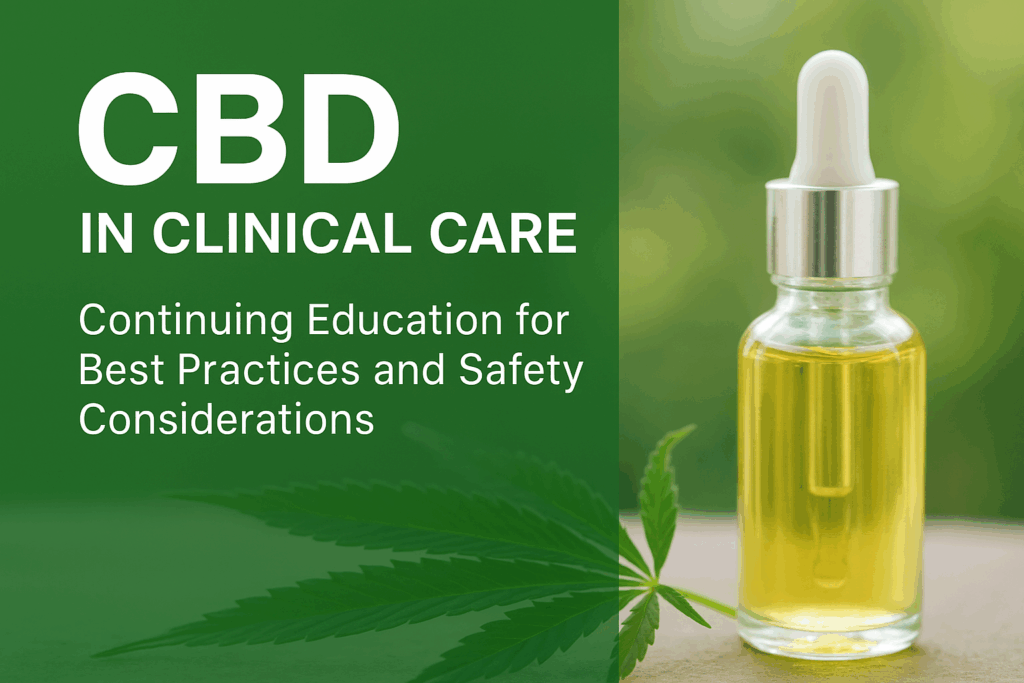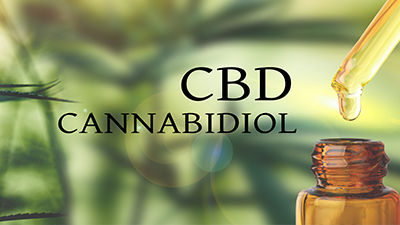
With the growing public use of cannabidiol (CBD) products, clinicians are increasingly encountering patients who self-administer CBD for a wide range of conditions. For physicians, nurses, pharmacists, and other healthcare providers, being well-informed about the use of CBD in clinical care is crucial for achieving better health outcomes. Despite limited FDA-approved indications, patients frequently view CBD as a “natural” therapeutic option. This evolving landscape underscores the critical need for healthcare providers to continue to update themselves with CE/CME courses to understand the pharmacology, potential benefits, risks, and interactions of CBD to ensure informed, evidence-based patient care.
What Continuing Medical Education on CBD Addresses can help Clinicians Know About CBD
Mechanisms of Action and Physiological Role
CBD, a phytocannabinoid derived from Cannabis sativa, modulates components of the endocannabinoid system (ECS) and influences other signaling pathways—including serotonin (5-HT1A), adenosine, and transient receptor potential (TRPV) channels. Understanding these mechanisms enables clinicians to appreciate how CBD may affect homeostatic processes such as pain perception, anxiety modulation, and inflammation regulation.
CBD Metabolism and Pharmacokinetics Information
CBD undergoes extensive hepatic metabolism, primarily via cytochrome P450 enzymes (CYP3A4 and CYP2C19), producing multiple active and inactive metabolites. The extent of first-pass metabolism can significantly influence bioavailability, which varies by route of administration. Also, patient-specific factors, including hepatic impairment, polypharmacy, or variable product purity, can alter CBD metabolism and thereby affect safety and efficacy.
Drug–Drug Interactions
CBD’s inhibition of CYP450 isoenzymes may alter the plasma concentrations of co-administered medications. Clinically significant interactions have been observed with:
- Anticoagulants (e.g., warfarin)
- Antiepileptics (e.g., clobazam, valproate)
- Antidepressants and antipsychotics
- Immunosuppressants and chemotherapeutics
Understanding these potential interactions is essential for mitigating iatrogenic harm. Accredited CME/CE courses such as “The Use of CBD in Clinical Care” focus on CBD pharmacology and provide clinicians with strategies to identify and manage such interactions.
Continuing Education for Safety and Monitoring Considerations
Adverse Effects and Tolerability
While generally well tolerated, CBD use can result in dose-dependent adverse events, including:
- Somnolence and fatigue
- Gastrointestinal disturbances (diarrhea, nausea)
- Changes in appetite or weight
- Elevations in hepatic transaminases—particularly when combined with valproate
Routine monitoring of liver function and medication levels is recommended in certain patient populations. Clinicians should also be aware that the unregulated nature of many over-the-counter CBD products raises concerns about product variability, contamination, and inaccurate labeling.
Best Practices for Healthcare Professionals
Healthcare providers should:
- Conduct thorough medication reconciliations to assess potential interactions.
- Counsel patients on safe product sourcing (e.g., third-party tested formulations).
- Employ shared decision-making when discussing CBD’s potential therapeutic role as well as CBD’s potential risks.
- Document patient use and observed effects in the medical record.
Participation in accredited CME/CE programs on CBD ensures that clinicians base recommendations on emerging evidence and established pharmacologic principles rather than anecdotal reports or marketing claims.
Current Evidence and Clinical Applications
The evidence base for CBD remains limited outside of FDA-approved indications (e.g., seizure disorders such as Lennox–Gastaut syndrome, Dravet syndrome and Tuberous Sclerosis Complex).
Preliminary clinical and preclinical research suggests possible benefit in several areas, including:
- Chronic pain syndromes
- Anxiety and sleep disturbances
- Inflammatory conditions
However, these findings are not yet definitive, and further randomized controlled trials are required to establish efficacy, safety, and dosing standards.
Who Should Pursue CBD Education?
- Physicians and Advanced Practice Clinicians: To strengthen patient counseling and integrate evidence-based decision-making.
- Pharmacists: To manage and monitor drug–drug interactions and product safety.
- Nurses and Allied Health Professionals: To improve patient education, patient care and interprofessional collaboration.
- Healthcare Teams: To align care approaches and establish consistent documentation practices.
Selecting Accredited CME/CE Courses
Enrolling in accredited CBD CME/CE programs offers:
- Verified, evidence-based content
- Continuing education credit applicable to licensure renewal
- Continuing education credit applicable to state-specific cannabis CME requirements
- Guidance on clinical, ethical, and regulatory issues related to CBD use
- Convenient online, self-paced learning options for busy professionals
FAQs About CBD in Clinical Care
Q1: What should healthcare professionals look for in a CE/CME course on CBD?
A best-in-class CE/CME course on CBD will cover topics such as the mechanism of action, the physiological role of CBDs, metabolism and pharmacokinetics information, drug interactions, safety monitoring, and treatment best practices.
Q2: Are accredited CBD CME courses available?
Choosing a reliable, quality educator is critical. Since 1998, The Answer Page has been a reliable online resource for medical providers worldwide, offering both nationally approved and state accredited courses.
Q3: Are there additional resources online for CBD information for a medical professional?
Yes. We here at The Answer Page, in keeping with our education focus, also offer a range of FREE education modules on clinically relevant topics.
Conclusion
CBD use among patients continues to rise, often without clinician oversight. For healthcare providers, remaining uninformed is no longer an option.
Comprehensive education on CBD pharmacology, safety, metabolism, and interactions enables providers to counsel patients effectively, mitigate risks, and contribute to safe, informed clinical practice.


